Question words (or open question words) are an extremely important part of any language because they allow us to expand our knowledge about the things happening around us. Open questions differ from yes-no questions in that the possible ways of responding to them are limitless – or in other words, they must be answered with more than just a yes or a no.
In Italian, there are a number of different ways to ask questions using open question words, most of which have an exact English equivalent. Let’s take a look at them now!
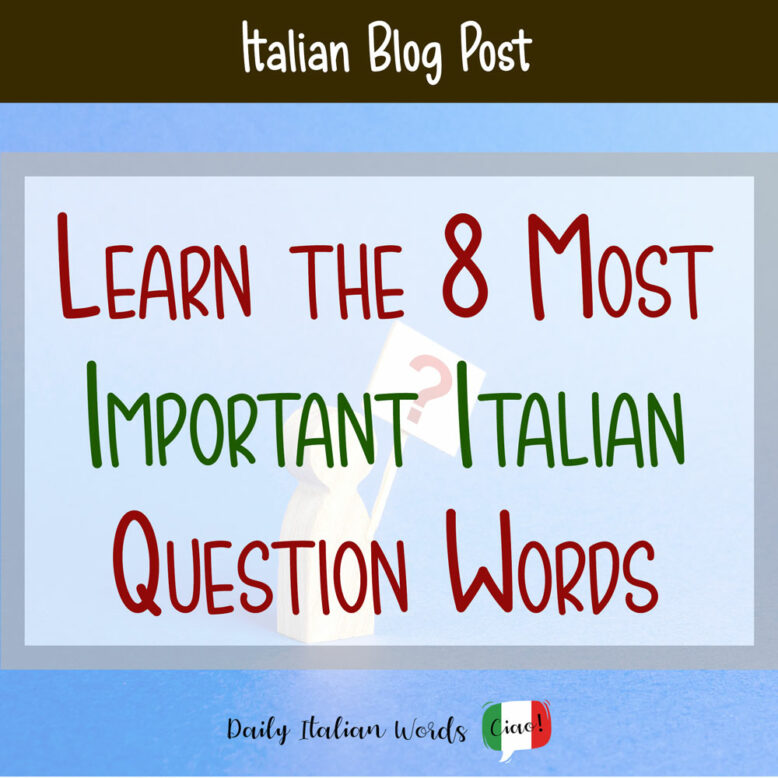
How to Say “Who / Whom / Whose” in Italian – Chi
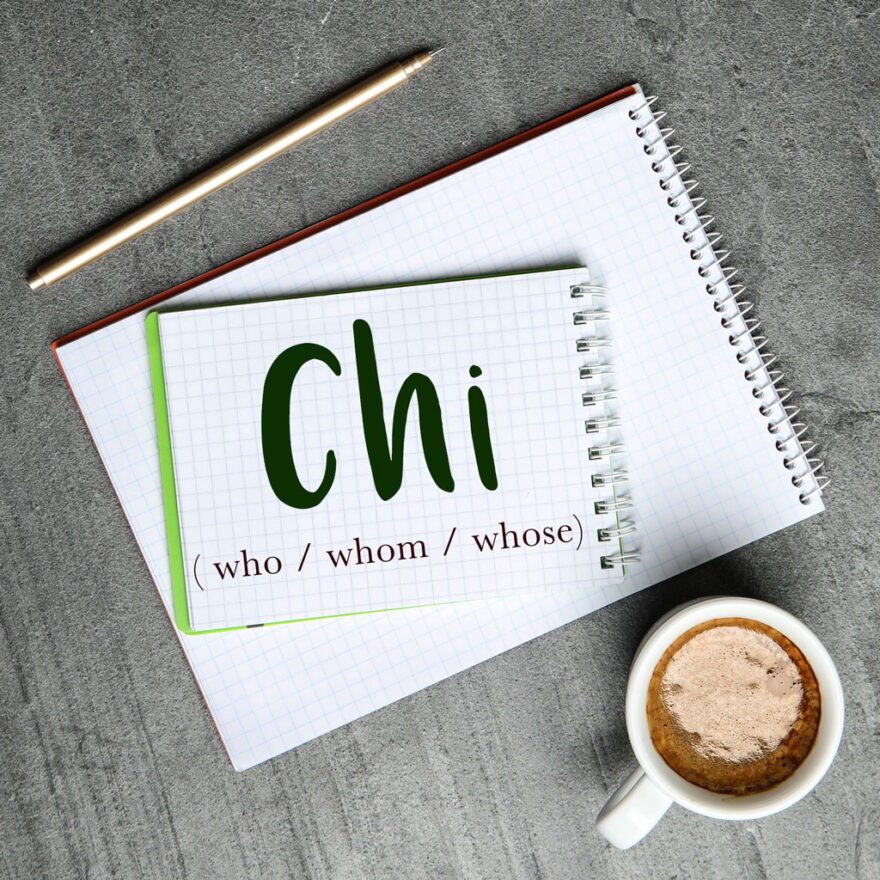
Chi is the word for who, whom and whose depending on the context.
When used to mean who, it comes at the beginning of the sentence and stands in the place of the subject.
- Chi viene alla festa? = Who is coming to the party?
(Marco viene alla festa. = Marco is coming to the party.) - Chi è quel uomo misterioso? = Who is that mysterious man?
(Marco è quel uomo misterioso. = Marco is that mysterious man.)
When chi takes the meaning of whom, it replaces the object and may be preceded by a preposition such as per, con, and so on.
- Chi hai visto? = Whom did you see?
(Hai visto Marco. = You (did) see Marco.)
- Con chi parli? = With whom are you speaking?
(Parli con Marco. = You are speaking with Marco.)
- Per chi sono i soldi? = For whom is the money?
(I soldi sono per Marco. = The money is for Marco.)
Chi can also mean whose when preceded by the preposition di.
- Di chi è questa macchina? = Whose car is this?
- Di chi è la responsabilità? = Whose responsibility is it?
Chi also appears in the word chissà which translates to who knows.
- Chissà da dove viene quella ragazza. = Who knows where that girl comes from.
How to Say “What” in Italian – Che cosa
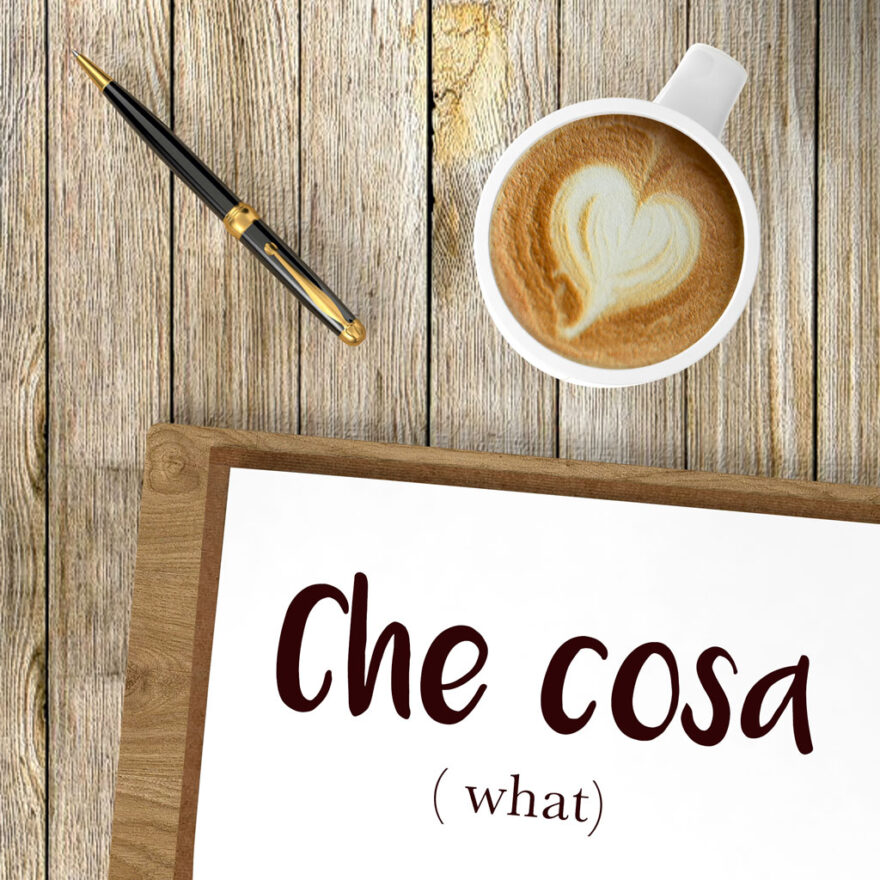
Che cosa is the most formal and correct way of saying what in Italian.
However in speech and in more informal contexts, you will certainly come across cosa and che on their own. Cosa is fairly standard whereas che can be considered slang.
- Che cosa fai? = What are you doing? (formal)
- Cosa fai? = What are you doing? (less formal, used with friends and children)
- Che fai? = Whatcha doin’? / What‘s up? (slang, used with friends, can be aggressive)
Che cosa can also be preceded by prepositions as in the following examples.
- Per che cosa usi il sito? = For what do you use the website? (What do you use the website for?)
- A che cosa serve? = What is it good for? (Lit: To what does it serve.)
When used with certain third-person forms of the verb essere (to be), Italians tend to remove the final a in cosa and replace it with an apostrophe, a process known as elision. It is valid for the spoken and written language.
The version without the elision is grammatically correct, though less popular. It is mainly a question of what feels more natural (which in most cases will be the version with the apostrophe).
- Che cos’è? / Che cosa è = What it is? (present tense, 3rd person singular)
- Che cos’era? / Che cosa era? = What was it? (imperfect tense, 3rd person singular)
- Che cos’erano? / Che cosa erano? = What were they? (imperfect tense, 3rd person plural)
How to Say “Where” in Italian – Dove
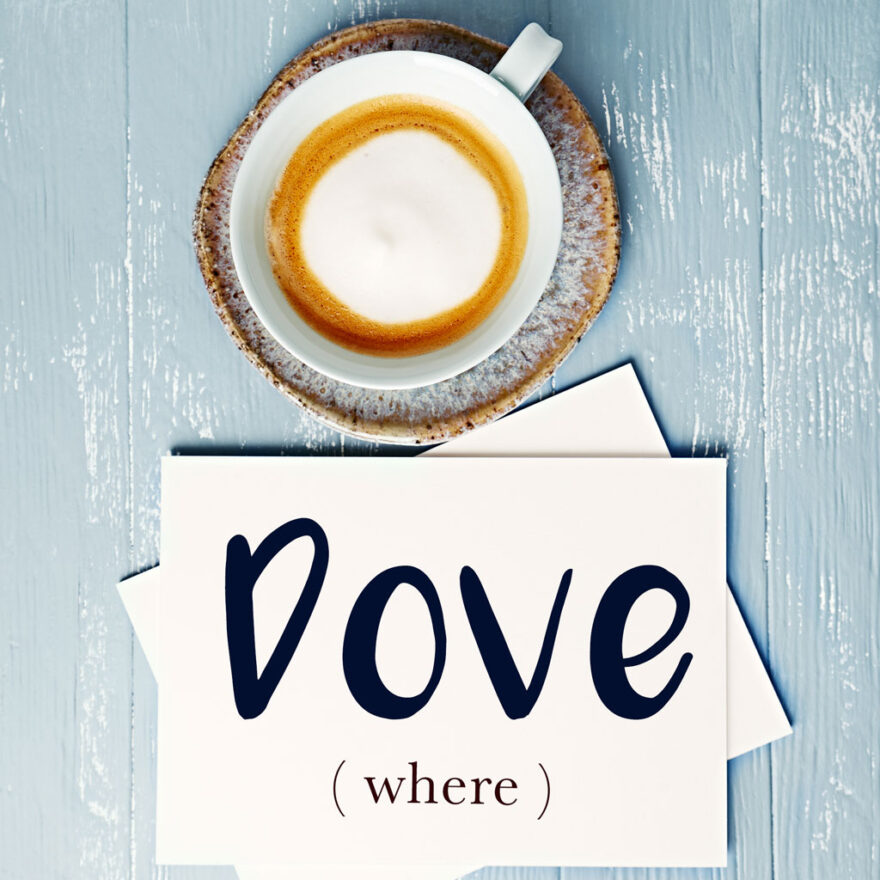
Dove is the word for where in Italian.
- Dove abiti adesso? = Where do you live now?
- Dove vai domani? = Where are you going tomorrow?
It can be preceded by the preposition da (from).
- Da dove vieni? = From where do you come? (Where do you come from?)
Like cosa, it often loses the final e to an apostrophe in sentences containing forms of essere that begin with the letter e.
- Dov‘è il latte? = Where is the milk?
- Dov’era il latte? = Where was the milk?
- Dov’eravate? = Where were you?
How to Say “When” in Italian – Quando
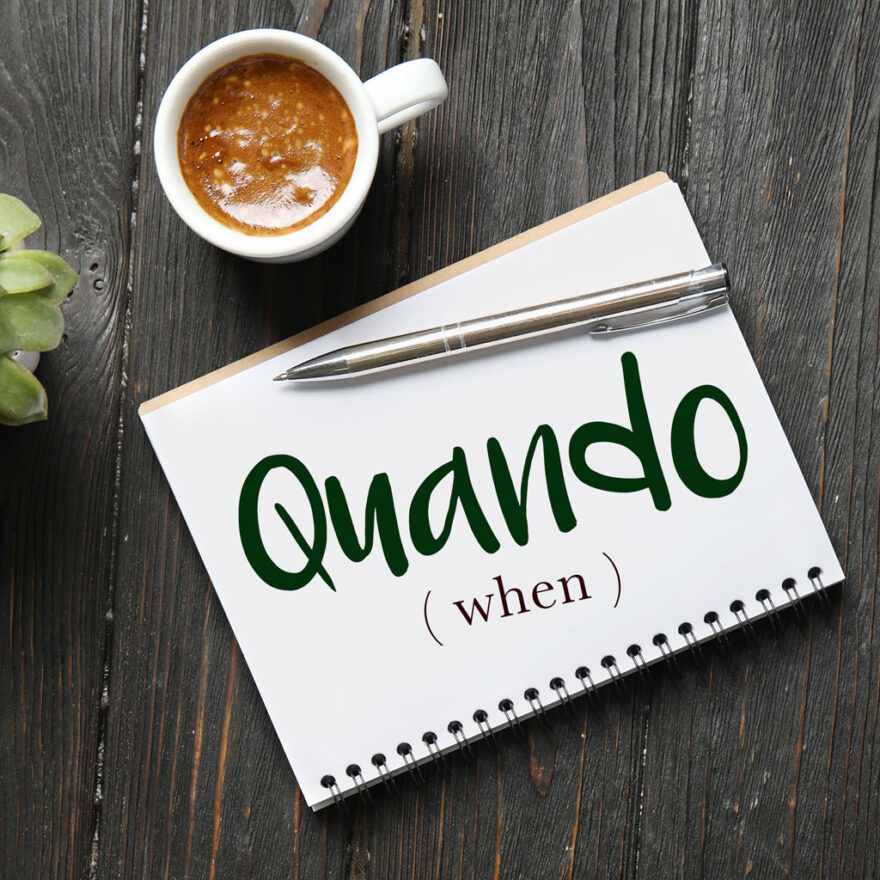
Quando is the word for when in Italian.
It can appear at the beginning of a sentence on its own…
- Quando torni in Italia? = When are you coming back to Italy?
- Quando vuoi andare in montagna? = When do you want to go to the mountains?
…or be preceded by a preposition such as da (from) or entro (by, within). When used with da, it can be translated as (for) how long or since when in English.
- Da quando vivi a Torino? = How long have you lived in Turin? / Since when have you been living in Turin?
- Entro quando devo pagare? = (By) when do I have to pay?
With essere once again you can choose to either truncate the final o or leave it as it is. In the written form however, you may come across the full version more often, especially in the case of the third person plural of the imperfect tense.
- Quand’è la festa? / Quando è la festa? = When is the party?
- Quand’era la festa / Quando era la festa? = When was the party?
- Quand’eravamo qui / Quando eravamo qui? = When were we here?
Note that when Italians talk about specific hours of the day, they tend to favour the expression a che ora over quando.
- A che ora vieni stasera? = At what time are you coming tonight?
How to Say “Why” in Italian – Perché
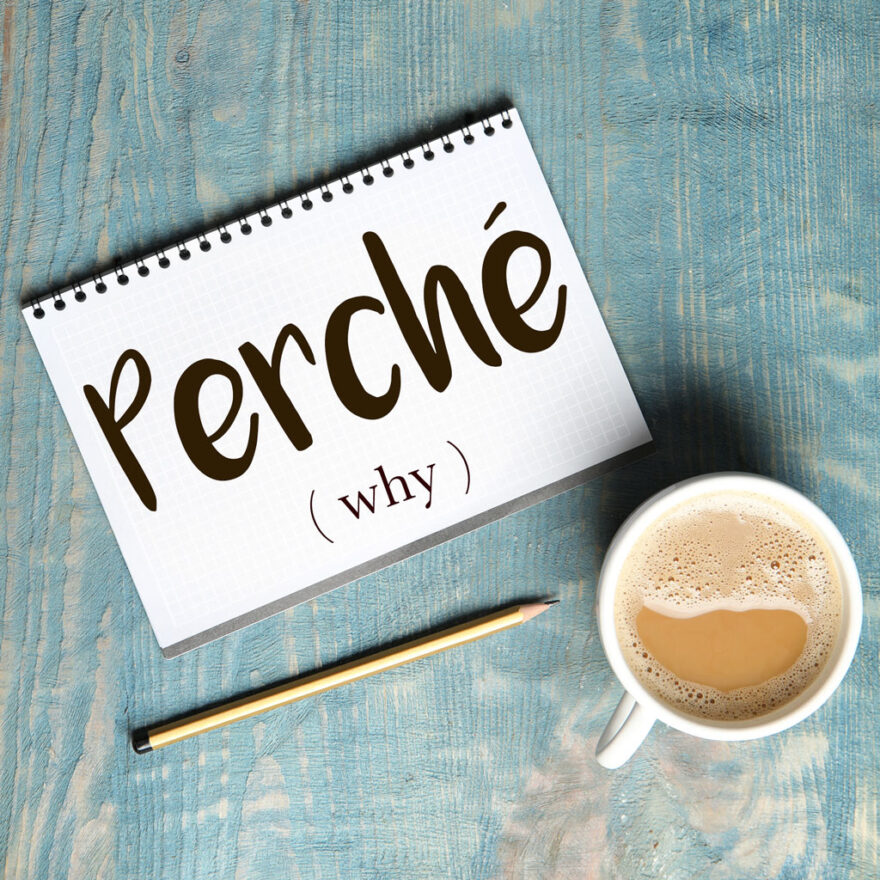
Perché is the question word for why in Italian.
- Perché vuoi imparare l’italiano? = Why do you want to learn Italian?
- Perché non vieni con me? = Why don’t you come with me?
A substitute for perché is per quale motivo which translates to for what reason in English.
- Per quale motivo hai deciso di smettere? = For what reason did you decide to stop?
It is also used in the set phrase perché no which means why not.
- Vuoi uscire con me? – Perché no. = Do you want to go out with me? – Why not.
How to Say “How” in Italian – Come

Come is the word for how (and sometimes what) in Italian.
It is used when you are inquiring about the condition of someone/something or the means/manner in which something is done.
- Come sta Marco? = How is Marco?
- Come si dice questo in giapponese? = How do you say this in Japanese?
- Come ha fatto a vincere? = How did he win?
Phonetically speaking, getting rid of the final e and replacing it with an apostrophe flows much better when combining come with essere. It sounds more natural and Italians do it automatically. However, skipping the elision is not incorrect. Note that when used with this verb, come often assumes the meaning what + like rather than how.
- Com’è l’università? = How is university? / What is university like?
- Com’era la festa? = How was the party? / What was the party like?
- Com’erano i ragazzi? = How were the guys? / What were the guys like?
An expression you’ll come across all the time is come mai which means how come.
- Come mai non mangi? = How come you’re not eating?
How to Say “How much / many” in Italian – Quanto
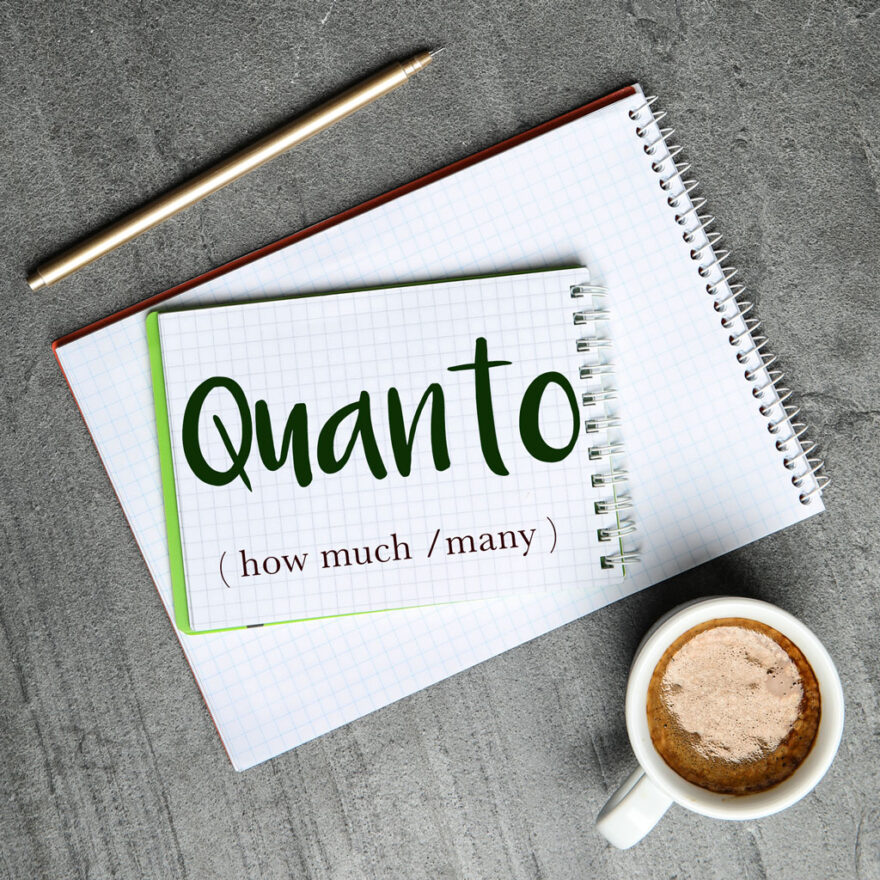
Quanto is the only question word on this list with feminine and plural forms.
Quanto (mas. singular) and quanta (fem. singular) are used to describe quantities of uncountable objects while quanti (mas. plural) and quante (fem. plural) are used for countable objects.
- Quanto zucchero vuoi? = How much sugar do you want?
- Quanta salsa hai messo? = How much sauce did you put on?
- Quanti animali ci sono? = How many animals are there?
- Quante persone vengono? = How many people are coming?
When talking about money (soldi), the Italians use the plural quanti. This is because in Italian, soldi is a plural noun whereas in English, it is considered a collective singular noun.
- Quanti soldi vuoi? = How much money do you want?
They can be preceded by prepositions such as in (in) or per (for).
- In quante siamo stasera? = How many of us (women) are there tonight?
- Per quanti devo apparecchiare? = For how many (people) must I set the table?
- Per quanto devo aspettare? = For how long must I wait?
Quanto is an extremely useful question word because it can be combined with vocabulary concerning time, distance and measurements.
- Quanto tempo ci vuole? = How much time / How long does it take?
- Quanto dista* la stazione? = How far is the station?
Note: dista is from the verb distare, which means to be distant, or to be apart.
In this case as well, cutting off the final o and replacing it with an apostrophe is completely optional when using è and essere in the imperfect tense. As you may have guessed at this point, the elision tends to be more popular in spoken Italian.
- Quant’è lungo il film? / Quanto è lungo il film? = How long is the film?
- Quant’era grande? / Quanto era grande? = How big was it?
- Quant’erano piccoli? / Quanto erano piccoli? = How small were they?
Quanto is also used in the set phrase Quanti anni hai? which means How old are you? (Lit: How many years do you have?) You would never say Quanto sei vecchio? in Italian to inquire about someone’s age.
How to Say “Which” in Italian – Quale
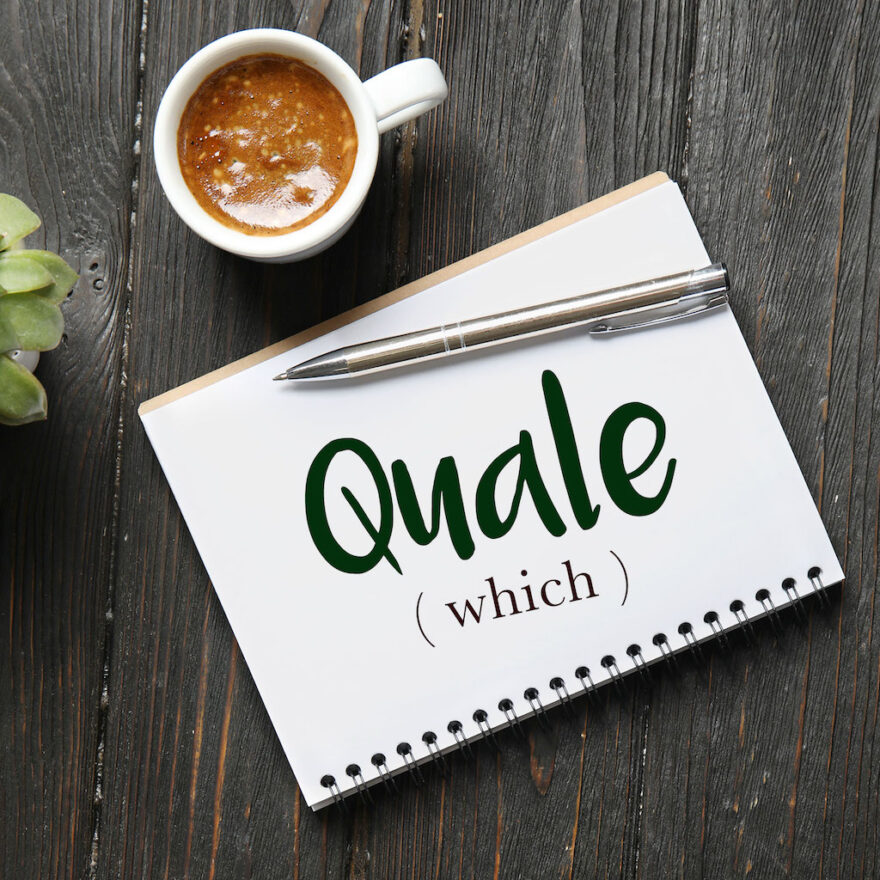
The last question word on this list is quale or which.
It can be used in the singular (quale) or plural form (quali).
- Quale treno prendi? = Which train are you taking?
- Quali treni prendi? = Which trains are you taking?
It can also be preceded by a preposition such as a (to) or per (for) for example.
- A quale stazione scendi? = At which station are you getting off?
- Per quale azienda lavori? = For which company do you work?
Important: with the verb essere, quale has to obey some unique rules that can be a bit confusing for learners.
The correct form is to ditch the e and skip the apostrophe. This is because, unlike the other examples above, qual exists as an autonomous form so there is no need to denote the absence of the e.
- Qual è la tua stagione preferita? = Which is your favourite season?
- Qual era la tua stagione preferita? = Which was your favourite season?
Note that in Italian literature, especially historical literature, you may find qual’è with the apostrophe (just to make things more confusing). In the modern Italian however, the apostrophe is not used.
In the third person plural, the elision is not incorrect but the tendency is to keep the final i:
- Quali erano i tuoi giocattoli preferiti? = Which were your favourite toys?
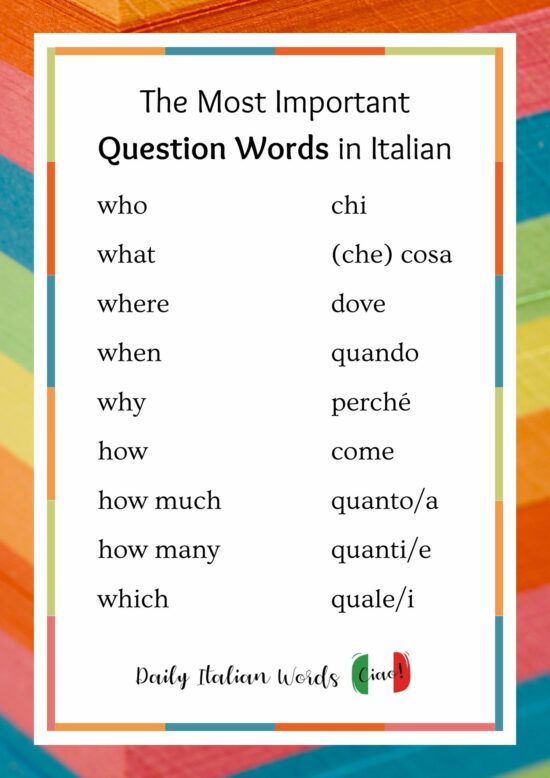
Well, that’s it! Why not ask us a question in the comments below? We’ll do our best to answer you! 😉
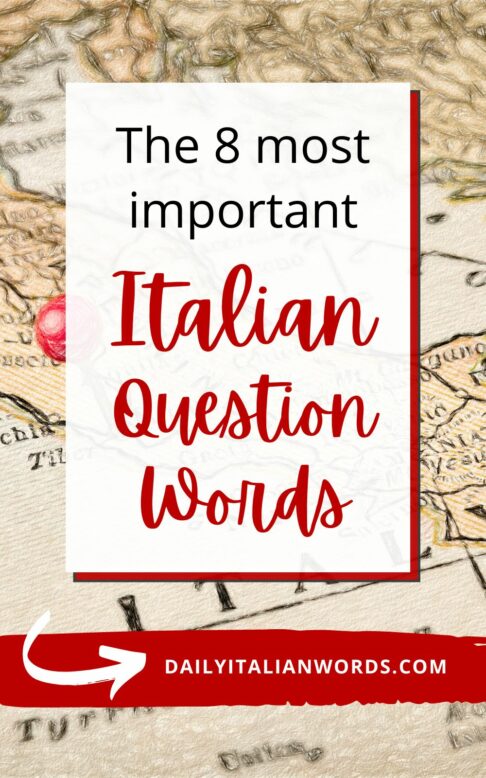
Heather Broster is a graduate with honours in linguistics from the University of Western Ontario. She is an aspiring polyglot, proficient in English and Italian, as well as Japanese, Welsh, and French to varying degrees of fluency. Originally from Toronto, Heather has resided in various countries, notably Italy for a period of six years. Her primary focus lies in the fields of language acquisition, education, and bilingual instruction.


